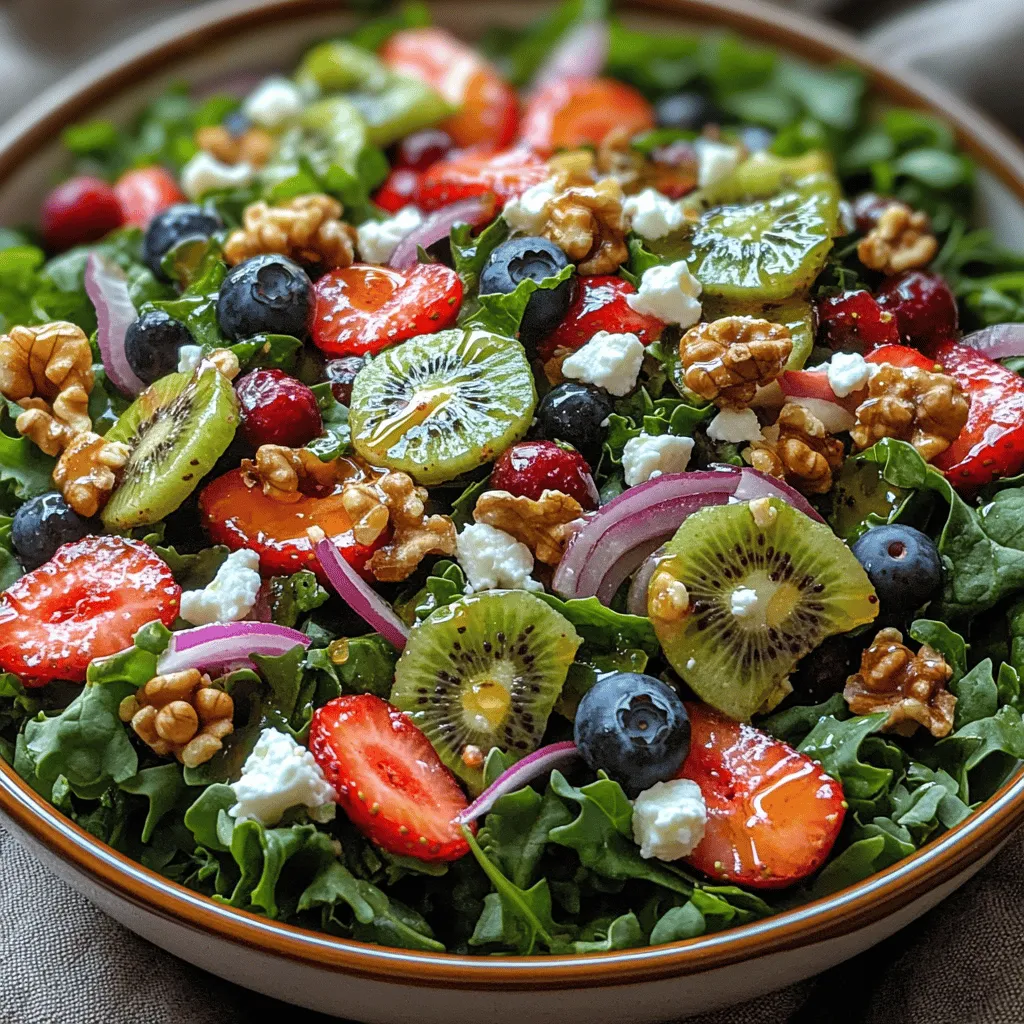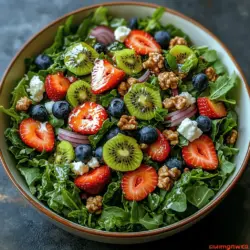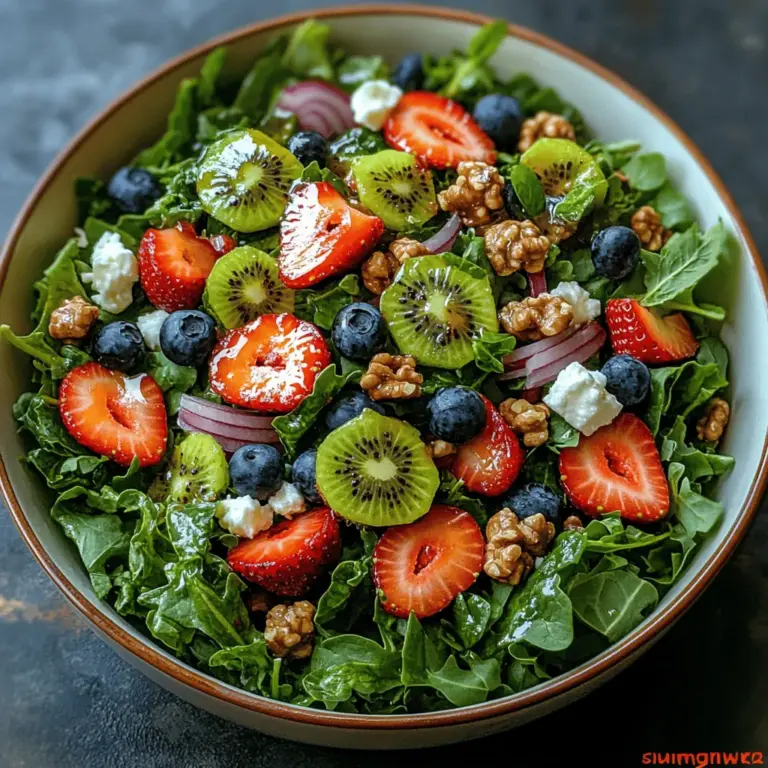Introduction
As the sun graces us with its warmth and the days grow longer, there’s nothing quite like the light and refreshing taste of a summer salad. Enter the Berry Kiwi Summer Salad, a vibrant dish that captures the essence of the season in every delicious bite. This salad is a luscious blend of fresh fruits, crisp greens, and a zesty dressing, making it the perfect accompaniment for sunny gatherings, picnics in the park, or simply as a light meal at home.
What sets this salad apart is not only its stunning visual appeal but also its rich nutritional profile. Bursting with vitamins, antioxidants, and healthy fats, the Berry Kiwi Summer Salad is a delightful treat that you can feel good about serving to family and friends. In this article, we will delve into the various components of this dish, providing you with a detailed understanding of the ingredients, their health benefits, and how to prepare them for optimal freshness and flavor.
Let’s embark on this culinary journey to create a salad that is as nourishing as it is enjoyable.
Understanding the Ingredients
Exploring the Base: Mixed Greens
Every great salad starts with a solid foundation, and for our Berry Kiwi Summer Salad, that foundation is a bed of mixed greens. The combination of arugula, spinach, and kale not only adds a variety of textures and flavors but also packs a powerful nutritional punch.
Health Benefits of Mixed Greens
– Arugula: Known for its peppery flavor, arugula is rich in vitamins A, C, and K, as well as folate and calcium. Its unique taste adds a delightful contrast to the sweetness of the fruits in the salad.
– Spinach: This leafy green is a nutritional powerhouse, loaded with iron, magnesium, and vitamins A and C. Spinach is also known for its anti-inflammatory properties, making it a great choice for overall health.
– Kale: Often hailed as a superfood, kale contains high levels of antioxidants, vitamins K, A, and C, and is a great source of fiber. Its sturdy leaves provide a satisfying crunch, enhancing the salad’s texture.
Tips for Selecting and Storing Fresh Greens
When choosing mixed greens, look for vibrant colors and crisp leaves without any signs of wilting or browning. Opt for organic greens when possible to avoid pesticide residues. Store your greens in a perforated plastic bag in the refrigerator’s crisper drawer to maintain freshness. Rinse them just before use to ensure they stay crisp and clean.
Highlighting the Fruits: Berries and Kiwi
The star of the Berry Kiwi Summer Salad is undoubtedly the combination of fresh berries and kiwi. These fruits not only add a burst of color but also provide an array of health benefits that make this salad a true summer delight.
Nutritional Benefits of Strawberries, Blueberries, and Kiwi
– Strawberries: Rich in vitamin C, manganese, and antioxidants, strawberries are excellent for boosting the immune system and reducing inflammation. They also contain dietary fiber, which is crucial for digestive health.
– Blueberries: Frequently labeled as a superfood, blueberries are packed with antioxidants known for their anti-aging properties. They are also a good source of vitamin K and vitamin C, making them a nutritious addition to any meal.
– Kiwi: This small fruit is a powerhouse of nutrients, containing high levels of vitamin C, vitamin K, and potassium. Kiwi also aids digestion due to its unique enzyme called actinidin, which helps break down proteins.
Seasonal Availability and Quality Indicators for Fruits
Berries are typically in season from late spring to early summer, while kiwi is best from late winter to early spring. When selecting fresh fruit, choose ones that are firm, plump, and free from bruises or blemishes. Berries should be vibrant in color, while kiwis should have a slight give when gently squeezed, indicating ripeness.
How to Wash and Prepare Fruits for Optimal Freshness
Before incorporating fruits into your salad, it’s important to wash them thoroughly. Rinse berries gently under cold water and allow them to drain on a paper towel. For kiwi, simply peel the skin, and slice it into rounds or wedges. This will ensure a fresh and clean taste, enhancing the overall quality of your salad.
Adding Flavor: Feta Cheese and Walnuts
To elevate the flavor profile of the Berry Kiwi Summer Salad, we introduce feta cheese and walnuts. These ingredients add a creamy texture and a satisfying crunch, creating a harmonious balance with the fruits and greens.
The Role of Feta Cheese in Adding Creaminess and Tang
Feta cheese is renowned for its crumbled texture and tangy flavor, which complements the sweetness of the berries and kiwi beautifully. It is also lower in fat compared to other cheeses, making it a healthier choice while still providing a rich taste. Feta is a good source of calcium and protein, contributing to the nutritional density of the salad.
Nutritional Benefits of Walnuts
Walnuts are a fantastic source of healthy fats, particularly omega-3 fatty acids, which are vital for heart health. They are also packed with antioxidants, protein, and fiber, making them an excellent addition to any diet. Including walnuts in your salad not only enhances the flavor but also adds a satisfying crunch.
Suggestions for Alternative Cheese and Nut Options
If feta cheese isn’t your preference, consider using goat cheese or mozzarella for a milder flavor. For nut alternatives, pecans or almonds work wonderfully in this salad, providing a slightly different taste while still offering health benefits.
Aromatic Enhancements: Red Onion and Fresh Mint
To round out the flavor of the Berry Kiwi Summer Salad, we’ll add red onion and fresh mint. These ingredients bring aromatic qualities that enhance the overall experience of the dish.
The Flavor Profile of Red Onion and Its Health Benefits
Red onions offer a sweet yet slightly sharp flavor that can elevate the taste of your salad. They are rich in antioxidants and contain compounds that may help reduce inflammation and lower blood sugar levels. When used sparingly, red onions add a delightful crunch and a pop of color.
The Refreshing Qualities of Mint and Its Culinary Uses
Fresh mint is an aromatic herb that brings a refreshing touch to this salad. It aids digestion and adds a burst of flavor that complements the sweetness of the fruits. Mint can be used not only in salads but also in beverages and desserts, further enhancing its appeal.
Tips for Chopping and Incorporating Herbs into Salads
To incorporate mint into your salad, gently rinse the leaves and pat them dry. Stack the leaves, roll them tightly, and slice thinly to create chiffonade. This method releases the essential oils, maximizing the flavor. Mix the mint into the salad just before serving to maintain its vibrant color and freshness.
Crafting the Perfect Dressing
The Role of Dressing in Salad
A salad is only as good as its dressing, and the right combination can elevate the flavors and textures of the ingredients. Dressings enhance the overall experience, providing a balance of acidity and sweetness that ties the dish together.
Balancing Acidity and Sweetness in Salad Dressings
A well-balanced dressing should incorporate both acidic and sweet elements to create depth in flavor. For the Berry Kiwi Summer Salad, we will focus on a light dressing that enhances the natural sweetness of the fruits while providing a tangy contrast.
Ingredients Breakdown: Olive Oil, Honey, and Apple Cider Vinegar
Health Benefits of Extra-Virgin Olive Oil
Extra-virgin olive oil is a staple in Mediterranean diets and is known for its heart-healthy properties. It is rich in monounsaturated fats and antioxidants that can help reduce inflammation and lower the risk of chronic diseases. When used in salad dressing, it adds a smooth richness that complements the other ingredients beautifully.
The Natural Sweetness of Honey and Its Alternatives
Honey not only adds sweetness but also brings a unique floral flavor to the dressing. It contains antioxidants and has antibacterial properties. For those seeking alternatives, maple syrup or agave nectar can provide similar sweetness without compromising the overall taste.
The Tanginess of Apple Cider Vinegar and Its Nutritional Properties
Apple cider vinegar is known for its tangy flavor and potential health benefits, including aiding digestion and regulating blood sugar levels. Its acidity helps to brighten the flavors of the dressing and balance out the sweetness of the honey.
In the subsequent sections of this article, we will guide you through the step-by-step instructions to prepare the Berry Kiwi Summer Salad and offer tips for achieving the best results. Stay tuned to discover how to bring this delightful dish to life!

Step-by-Step Guide to Whisking the Dressing
Creating the perfect dressing is crucial for enhancing the flavors in your Berry Kiwi Summer Salad. A well-emulsified dressing not only adds moisture but also binds the ingredients together, providing a harmonious taste experience. Here’s how to achieve that ideal emulsification:
1. Choose Your Base: Start with a high-quality oil, such as extra virgin olive oil or avocado oil. The richness of the oil will complement the sweetness of the berries and the tartness of the kiwi. Aim for a ratio of 3 parts oil to 1 part acid (vinegar or citrus juice).
2. Add Your Acids: Incorporate a splash of apple cider vinegar or fresh lime juice for brightness. These acidic components will balance the sweetness of the fruits.
3. Whisking Techniques:
– Hand Whisking: In a small bowl, add your oil and acid first. Using a whisk, begin mixing vigorously in a circular motion. This motion incorporates air, which helps in emulsifying the oil and vinegar.
– Using a Jar: Alternatively, you can combine the ingredients in a mason jar. Add the oil, vinegar, salt, and pepper, then secure the lid tightly and shake vigorously for about 30 seconds until the mixture is well combined and slightly thickened.
4. Flavor Adjustments: Once you have achieved a good emulsification, taste your dressing. Season with salt and pepper to your preference. Start with a pinch of salt and a few cracks of pepper, then adjust as necessary. Remember, the dressing should enhance the salad without overpowering the fresh flavors of the fruits.
Assembling the Berry Kiwi Summer Salad
Now that you have your dressing ready, it’s time to assemble your Berry Kiwi Summer Salad. This step involves preparing each component with care to ensure a visually appealing and delicious final dish.
Step-by-Step Preparation Guide
1. Prepare the Greens: Begin with the base of your salad. Rinse and dry several cups of fresh greens, such as baby spinach or mixed greens. Use a salad spinner to remove excess water, as wet greens can dilute the dressing.
2. Cut the Fruits:
– Berries: Rinse 1 cup each of strawberries, blueberries, and raspberries. Slice the strawberries into thin rounds or quarters, depending on your preference.
– Kiwis: Peel and slice 2 ripe kiwis into rounds. For visual appeal, consider cutting them into half-moons.
3. Layering Ingredients: For a beautiful presentation, layer your ingredients starting with the greens at the bottom. Add the sliced strawberries, blueberries, raspberries, and kiwi on top. This not only looks stunning but allows guests to see the vibrant colors of the fruits.
4. Tossing the Salad: When it’s time to serve, drizzle the dressing over the salad. To avoid wilting the greens, use a gentle tossing motion. Hold the base of the bowl with one hand while using the other to lift the greens from the bottom and turn them over. This ensures each leaf gets coated without breaking down the salad.
Serving Suggestions
The Berry Kiwi Summer Salad can be a showstopper on any table when presented with a touch of creativity. Here are some ideas to enhance your dining experience:
– Presentation Ideas: Serve the salad in a large, shallow bowl to display the colorful layers. For individual servings, consider using mason jars or small bowls, layering the ingredients in the same way for a charming, portable option.
– Pairing Recommendations: This salad pairs beautifully with grilled proteins. Consider serving it alongside grilled chicken, shrimp, or tofu for a complete meal. Complement the dish with a crisp white wine, such as Sauvignon Blanc, or a refreshing herbal iced tea, enhancing the light and fresh flavors of the salad.
Nutritional Benefits of the Berry Kiwi Summer Salad
This Berry Kiwi Summer Salad is not just a feast for the eyes; it also boasts numerous health benefits, making it a smart addition to your diet.
Caloric Breakdown and Macro-Nutrient Overview
– Caloric Content: Each serving of this salad contains approximately 250 calories, depending on the portion of dressing used. This makes it a light yet satisfying option for lunch or dinner.
– Macronutrients:
– Proteins: The salad provides a small amount of plant-based protein from the greens and fruits, roughly 3 grams per serving.
– Carbohydrates: The primary source of energy comes from the fruits, contributing about 30 grams of carbohydrates, predominantly from natural sugars.
– Fats: The dressing, especially if made with olive oil, adds healthy fats, around 15 grams per serving.
Vitamins and Minerals for Optimal Health
– Vitamin C: The berries and kiwis are rich in vitamin C, essential for immune function, skin health, and antioxidant protection.
– Fiber: This salad offers a good amount of dietary fiber, promoting digestive health and keeping you feeling full longer.
– Potassium: Kiwis are a great source of potassium, which supports heart health and helps regulate blood pressure.
By including a variety of colorful fruits and greens, this salad supports your overall well-being and helps maintain a balanced diet.
Seasonal and Occasion-Based Variations
One of the joys of the Berry Kiwi Summer Salad is its versatility. You can easily adapt it to suit different seasons and occasions.
Adapting the Salad for Different Seasons
1. Winter Variations: During colder months, consider swapping out fresh berries for dried fruits like cranberries or cherries. Add roasted nuts for a crunchy texture and warmth.
2. Fall Additions: Incorporate sliced apples or pears and sprinkle with cinnamon for a seasonal twist. A sprinkle of feta cheese can also add a savory element.
3. Spring Enhancements: Add fresh herbs such as mint or basil to brighten the flavor profile. You can also include peas or snap peas for a crunchy texture.
Celebratory and Holiday Adaptations
– Festive Gatherings: For holiday celebrations, elevate the salad with festive toppings like pomegranate seeds or candied nuts. Consider drizzling a balsamic reduction over the top for added sweetness and visual appeal.
– Enhancing with Proteins: For special occasions, toss in grilled salmon or a honey-glazed chicken breast to transform the salad into a hearty main dish.
Conclusion
The Berry Kiwi Summer Salad is not just a dish; it’s a celebration of freshness and flavor that can be enjoyed year-round. By understanding the ingredients, mastering the preparation, and appreciating the nutritional benefits, you can elevate your culinary skills and delight your taste buds. Whether served as a standalone meal or as a side dish, this salad embodies the joy of healthy eating and the beauty of seasonal produce. Embrace the simplicity and deliciousness of this recipe, and make it a staple in your culinary repertoire. With its vibrant colors and refreshing taste, the Berry Kiwi Summer Salad is sure to impress guests and bring a touch of summer to any table.

